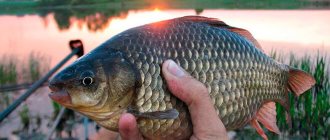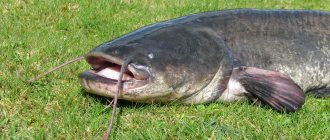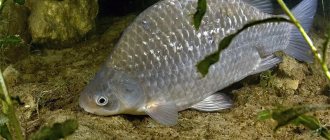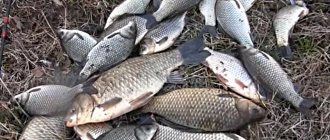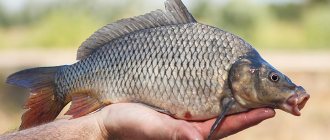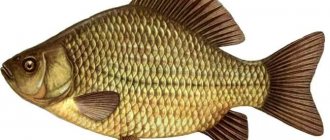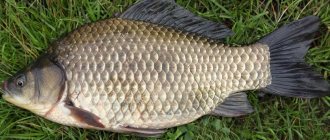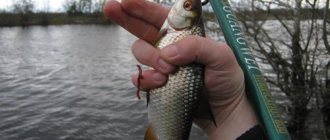1
Fishing can be called a separate world. There are laws and rules here, compliance with which will lead to a rich catch, and failure to comply will leave you with nothing. Adding aromatic additives, and in particular garlic, to the bait and bait helps to activate the bite and keep the fish in the baited area. But before you prepare the delicacy, you should figure out what kind of fish loves the smell of garlic and will respond to it with pleasure.
Types of fish that prefer the smell of garlic
Garlic is often used as fish bait, and experienced fishermen know how and where to use it correctly. Basically, garlic dishes are prepared when you plan to fish with a feeder or float tackle. It is not clear why residents of reservoirs love this plant crop so much, but the fact remains.
Fish that are not averse to eating garlic are:
- crucian carp is one of the main garlic gourmets. This fish generally has special eating habits. All “folk baits” are suitable for crucian carp, such as kerosene and yogurt. Garlic will work especially well in cold water;
- carp - like its closest relative - crucian carp, prefers spices, and garlic is one of the first on the list. It is added to the bait in large quantities and this does not scare off the carp;
- bream - prefers garlic at the beginning of the season, but then you need to think about a different flavor;
- roaches - they peck at garlic mainly with the arrival of spring;
- carp - prefers garlic, but in small quantities and mixed with other aromas.
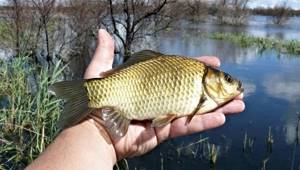
To improve the quality of the bite, it is not necessary to use garlic as the only component.
For example, for carp it can be combined with fennel, dill or thyme. In warm water, he will peck at a mixture of garlic with honey or vanilla. For cold water, it is better to choose an “animal” combination: crab, shrimp, mussel, etc. In addition to the fish described above, trout, rudd and even perch are also caught.
Attractants for carp bait
Flavorings for carp, as well as for other types of cold-blooded inhabitants, depending on the form and purpose, can be divided into:
- Products used for processing tackle, baits, hooks, boilies. These include:
- sprays are spray cans filled with an aromatic agent, including natural and artificial ingredients;
- dips - products into which basic media are dipped - nozzles, boilies, plastic balls, etc., are often produced in liquid form, but there are gels and powders.
- Substances added to bait:
- boosters - used to obtain the required consistency by moistening dry mixtures with the addition of specific aromas that interest carp;
- oils and fats are natural flavorings of animal and plant origin.
- Materials used at the stage of preparing pasta and boilies:
- attractants - aromatic agents with specific components (odor enhancers, taste sweeteners) that attract carp to the fishing site and provoke biting;
- liquids for carp are any liquid aromatic additives, artificially synthesized and natural.
As already noted, this classification is conditional, and the names of flavors have a general meaning.
Often, fishermen use flavorings for carp, based on their experience or necessity. So, you can treat the bait with a spray, and treat the bait with an attractant or liquid. The main thing is to understand that there is no universal remedy that is effective always and everywhere.
fishelovka.com
bait for fishing for bream, roach, carp, crucian carp with your own hands , but you can also buy it.
Before going fishing, many fishermen wonder how to make good bait for fishing, because the weight of the cage at the end of fishing depends on it. In this article you will learn about what aromas and smells some types of fish like.
For fishing nowadays, various flavoring additives are used for bait. There are a huge number of scents. By type they are divided into dry and liquid. With their help, the desired aroma of the bait as a whole is achieved. There are also flavors that are intended for attachment, they are called dips. The bait, which is treated with dip, once in the water, is distinguished by a spectacular aroma and taste stain. All the huge variety of tastes and aromas can be divided into several types: 1. Herbs and spices. 2. Creamy and caramel. 3. Nut and fruit. In addition, each type of fish has its own smells. Some of them can attract any fish, others only one, for example bream, roach, etc. After reading this you probably thought it was pretty hard, but it's actually quite simple. To find out what taste and smell the fish prefer in your pond, follow what you read below.
Bait flavors for bream
The aroma of anise for bream is unrivaled, followed by coriander; our grandfathers and great-grandfathers also used them. Also good aromas for catching bream are matting and dill. Depending on the preferences of the bream in the specific reservoir chosen, there is pepper (black and red). If the bream likes the aroma of pepper in your pond, you will never be left without a catch. The smell of garlic works a little worse on bream, but even if it is suitable for a reservoir, you will not know how to bring the fish home. In summer, when the water reaches 24-25 degrees, try using the scent of dill. Your surprise will know no bounds. Ideal flavors for bream include caramel, vanilla, biscuit, cream, and milk.
and bream scents work best when the weather is cool. The bites on such days are more intense when using these scents. From the fruit group, the scent of strawberries works great. On cool days, bream flavors such as pineapple and banana work well. Although they are not familiar to bream in our reservoirs, they are nevertheless good at collecting bream in the right place. From the nut group, ground nuts or cake are a good way to attract bream. More and more often, fishermen use the aromas of almonds, hazelnuts and peanuts when catching bream. They are equally effective not only in the warm, but also in the cold season. You can also read about bream fishing tips.
Fragrances for roaches
From the caramel-cream group, the smells of milk chocolate, baked milk, and cheese are excellent for attracting roaches. These scents for roaches are universal and can be used at any time of the year. It has never been observed that these aromas had a bad effect on the roach’s bite. From the fruit group of aromas, the scent of melon is suitable for roaches. Even though she doesn't know it, it works great. In order to effectively catch roaches on warm days, the smell of melon is indispensable. On cold days, the scent of tangerine works great for roaches. The tangerine scent must be handled carefully; if you add too much of it, the bait for catching roach will be spoiled. From the nut group, the scent of coconut works well for roaches. The smell of coconut attracts roaches only in the warm season.
You can read about how and what to catch roach here.
Groundbait flavors for crucian carp and crucian carp
Crucian carp and carp are fish that can be combined into one group. The thing is that these are closest relatives; they are also found side by side in bodies of water. So, what aromas do carp and crucian carp like? From the group of spices, carp and crucian carp prefer vanilla, cinnamon, garlic, pepper (red and black), and anise. They can be added to bait in large quantities. From the caramel-cream group, crucian carp and carp prefer bait with the smell of chocolate, biscuit and other milk aromas. Absolutely all scents from this group are suitable here. From the fruit group, the smells of melon, strawberry, pineapple, blackberry and plum are very attractive to carp and crucian carp. From the nut group, the best bait smells are hazelnuts and peanuts.
These are mainly two smells that carp and crucian carp like. Of course, there are exceptions; here you need to experiment on a specific body of water. In addition to the aromas listed above, the smells of hemp and corn also work well, especially for catching roach and carp. The smell of peas and honey works very well for carp. Peas are also good for baiting bream. When fishing for carp, seafood aromas (shrimp, crabs, mussels and others) are also very often used. These odors are of course very specific and are used exclusively in cold water. You need to be careful with seafood smells for carp fishing, because if the carp doesn’t like the smell, the fishing spot will need to be changed. When catching perch with a worm or bloodworm, you can treat the bait with a dip with the smell of garlic; the perch is simply delighted with this smell.
You can read about how to catch carp using corn and how to cook it here.
You can treat any baits with dip, as they are designed for all types of baits, from bloodworms to corn. The main thing is that the fish become interested in this smell. You will find out very soon after casting whether the fish liked the aroma or not. If the fish did not like the smell that was applied to the bait, there will be no bites for much longer until the smell of the dip disappears. Finding flavors these days is not difficult, the only catch is money. If you don’t have a lot of money, then I advise you to refrain from purchasing it altogether; cheap flavors and low-quality dips for baits will have a subtle smell. A good quality dip or flavoring for bait should smell at a distance of 10 meters
rybsoveti.ru
Making your own garlic bait
There are a lot of options for preparing garlic dishes. It is added everywhere and in any form:
- in powder form into dough;
- both fresh and in powder form are mixed into the bread crumb;
- add a little garlic butter to semolina or pea porridge;
- you can “scent” the worms with garlic perfume;
- Rub the styrofoam balls with fresh garlic.
Garlic in its pure form is rubbed onto maggots or worms, after grinding the spice on a fine grater.
It is only important to do this before attaching the bait to the hook. If you leave the animals in the garlic overnight, you will see their corpses in the morning.
Of course, you can go to a fishing store and buy garlic additive in the form in which your heart desires. But a more economical and profitable option is to add fresh garlic to your fish bait at home. After all, if it doesn’t grow in your own garden, it’s definitely sold in the supermarket and costs a penny.
Making Garlic Oil
To prepare garlic oil for fishing, it is recommended to use odorless vegetable or olive oil, but unrefined sunflower oil can add a touch of piquancy to the dish. The garlic is first very finely rubbed or ground. Try to make it as small as possible and then the fish bait will cook faster. The prepared spice is added to the oil. Using the same principle, you can make butter with garlic powder.
There is another faster way to make garlic butter. To do this, heat the oil almost to boiling point. If the liquid begins to splash, it means the required temperature has been reached. Add garlic in any form and cook for a few minutes. The prepared mixture will have a slightly different smell, but the fish will still like it.
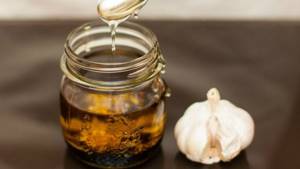
Garlic oil
The beauty of garlic oil is that it can be dosed into bait mixtures in any desired quantity. It is combined with menthol, vanilla, dill oil, etc. Thus, through trial and error, an effective bait is selected that is suitable for a certain type of fish in a specific body of water.
How to make bait from bread
Grinded (crushed) garlic is added to regular olive oil without impurities.
The secret of preparation is that the finer the fractions of the root vegetable, the faster the oil will infuse. For example, if you add a whole clove, the mixture will acquire a smell in a month, and by adding crushed garlic, the oil will infuse in a week. They say that using sunflower oil will also bring a good effect due to its specific aroma.
Pour oil into a pan, place it on the stove and heat it to a temperature of one hundred degrees. It is difficult to confuse, as the oil in the container will splash. Add garlic, cook for a few minutes. That's it, the aromatic mixture is ready. It will smell differently, but the fish will bite well.
Thank you for reading to the end. If you were interested, please like (finger
